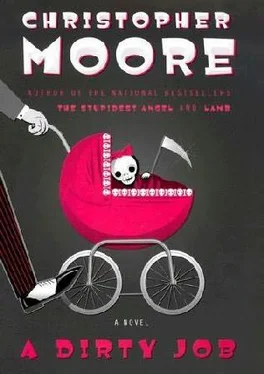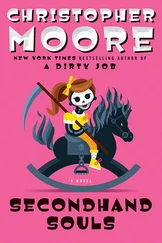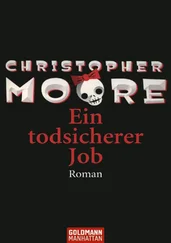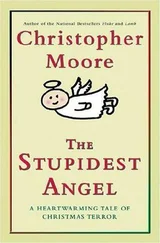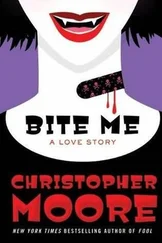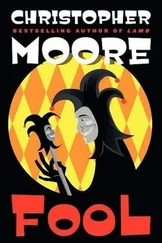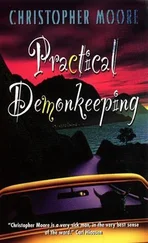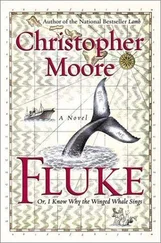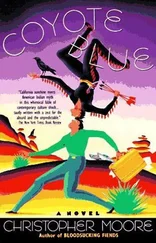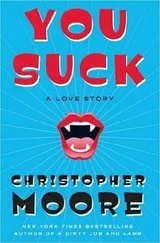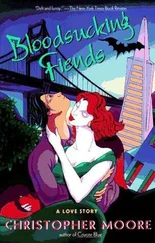“Mmm, strawberry,” Madeline said.
“That’s right, strawberry. Would you like to wash it down with some water?” The nurse held the sippy cup.
“No. Cheese. I’d like some cheese.”
“I can get you some cheese,” said the nurse.
“Cheddar cheese.”
“Cheddar it is,” said the nurse. “I’ll be right back.” She tucked the covers around Madeline and left the room.
The old woman looked at Charlie again. “Can you talk, now that she’s gone?”
Charlie shrugged and looked in every direction, his hand over his mouth, like someone looking for an emergency spot to spit out a mouthful of bad seafood.
“Don’t mime, honey,” Madeline said. “No one likes a mime.”
Charlie sighed heavily, what was there to lose now? She could see him. “Hello, Madeline. I’m Charlie.”
“I always liked the name Charlie,” Madeline said. “How come Sally can’t see you?”
“Only you can see me right now,” Charlie said.
“Because I’m dying?”
“I think so.”
“Okay. You’re a nice-looking kid, you know that?”
“Thanks. You’re not bad yourself.”
“I’m scared, Charlie. It doesn’t hurt. I used to be afraid that it would hurt, but now I’m afraid of what happens next.”
Charlie sat down on the chair next to the bed. “I think that’s why I’m here, Madeline, you don’t need to be afraid.”
“I drank a lot of brandy, Charlie. That’s why this happened.”
“Maddy—can I call you Maddy?”
“Sure, kid, we’re friends.”
“Yes, we are. Maddy, this was always going to happen. You didn’t do anything to cause it.”
“Well, that’s good.”
“Maddy, do you have something for me?”
“Like a present?”
“Like a present you would give to yourself. Something I can keep for you and give you back later, when it will be a surprise.”
“My pincushion,” Madeline said. “I’d like you to have that. It was my grandmother’s.”
“I’d be honored to keep that for you, Maddy. Where can I find it?”
“In my sewing box, on the top shelf of that closet.” She pointed to an old-style single closet across the room. “Oh, excuse me, phone.”
Madeline talked to her oldest daughter on the edge of the comforter while Charlie got the sewing box from the top shelf of the closet. It was made of wicker and he could see the red glow of the soul vessel inside. He removed a pincushion fashioned from red velvet wrapped with bands of real silver and held it up for Madeline to see. She smiled and gave him the thumbs-up, just as the nurse returned with a small plate of cheese and crackers.
“It’s my oldest daughter,” Madeline explained to the nurse, holding the edge of the comforter to her chest so her daughter didn’t hear. “Oh my, is that cheese?”
The nurse nodded. “And crackers.”
“I’ll call you back, honey, Sally has brought cheese and I don’t want to be rude.” She hung up the sheet and allowed Sally to feed her bites of cheese and crackers.
“I believe this is the best cheese I’ve ever tasted,” Madeline said.
Charlie could tell from the expression on her face that it was, indeed, the best cheese she had ever tasted. Every ounce of her being was going into tasting those slivers of cheddar, and she let loose little moans of pleasure as she chewed.
“You want some cheese, Charlie?” Madeline asked, spraying cracker shrapnel all over the nurse, who turned to look at the corner where Charlie was standing with the pincushion tucked safely in his jacket pocket.
“Oh, you can’t see him, Sally,” Madeline said, tapping the nurse on the hand. “But he’s a handsome rascal. A little skinny, though.” Then, to Sally, but overly loud to be sure that Charlie could hear: “He could use some fucking cheese.” Then she laughed, spraying more crackers on the nurse, who was laughing, too, and trying not to dump the plate.
“What did she say?” came a voice from the hall. Then the two sons and the daughter entered, chagrined at first at what they had heard, but then laughing with the nurse and their mother. “I said that cheese is good,” Madeline said.
“Yeah, Mom, it is,” said the daughter.
Charlie stood there in the corner, watching them eat cheese, and laughing, thinking, This should have been in the book . He watched them help her with her bedpan, and give her drinks of water, and wipe her face with a damp cloth—watched her bite at the cloth the way Sophie did when he washed her face. The eldest daughter, who Charlie realized had been dead for some time, called three more times, once on the dog and twice on the pillow. Around lunchtime Madeline was tired, and she went to sleep, and about a half hour into her nap she started panting, then stopped, then didn’t breathe for a full minute, then took a deep breath, then didn’t.
And Charlie slipped out the door with her soul in his pocket.
13
CRY HAVOC, AND LET SLIP THE GOGS OF WAR!
Watching Madeline Alby die had shaken Charlie. It wasn’t her death so much, it was the life he’d seen in her minutes before she passed. He thought: If you have to stare Death in the eye to be able to take the life out of your moments, then who better to do it than the man who shaves Death’s face?
“Cheese wasn’t in the book,” Charlie said to Sophie as he walked her out of the shop in her new runner’s stroller—which looked like someone had crossbred a carbon-fiber bicycle and a baby carriage and ended up with a vehicle you could use to take a day trip to Thunderdome—but it was strong, easy to push, and kept Sophie safely wrapped in an aluminum frame. Because of the cheese, he didn’t make her wear her helmet. He wanted her to be able to look around, see the world around her, and be in it. It was watching Madeline Alby eat cheese with every ounce of her being, like it was the first and best time, that made him realize that he had never really tasted cheese, or crackers, or life. And he didn’t want his daughter to live that way. He’d moved her into her own room the night before, the bedroom that Rachel had decorated for her with clouds painted on the ceiling and a happy balloon carrying a happy bunch of animal friends across the sky in its basket. He hadn’t slept well, and had gotten up five times during the night to check on her, only to find her sleeping peacefully, but he could lose a little sleep if Sophie could go through life without his fears and limitations. He wanted her to experience all the glorious cheese of life.
They strolled through North Beach. He stopped and bought a coffee for himself and some apple juice for Sophie. They shared a giant peanut-butter cookie, and a crowd of pigeons followed them down the sidewalk feasting on the river of crumbs that flowed from Sophie’s stroller. The World Cup soccer championships was playing on televisions in bars and cafés, and people spilled out onto the sidewalks and out into the street, watching the game, cheering, jeering, hugging, swearing, and generally acting out waves of elation and dejection in the company of new companions who were visiting this Italian-American neighborhood from all around the world. Sophie cheered with the soccer fans and shrieked with joy because they were happy. When the crowd was disappointed—a kick blocked, a play foiled—Sophie was distressed, and would look to her daddy to fix it and make everyone happy again. And Daddy did, because a few seconds later, they were all cheering again. A tall German man taught Sophie to sing “Goooooooooooooooooooooal!” the way the announcer did, practicing with her until she got the full five-second sustain, and she was still practicing three blocks away, when Charlie had to shrug at confused onlookers as if to say, The kid’s a soccer fan, what can you do?
Читать дальше
